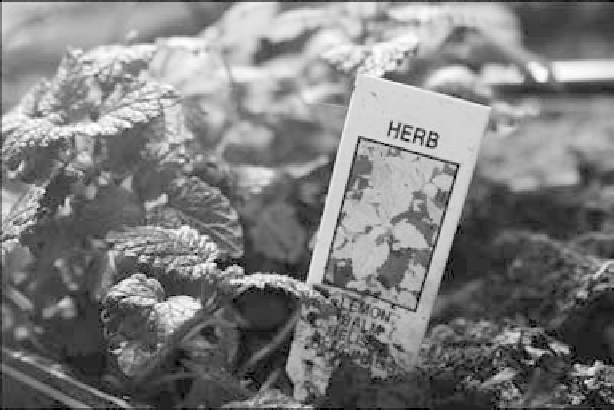Agriculture Reference
In-Depth Information
Lemon Balm (
Melissa officinalis
)
Lemon balm is an herbaceous perennial that has a deliciously fragrant citrus scent. The herb is con-
sidered invasive in some areas but will naturalize to form an attractive ground cover and is hardy
to zone 4. The plant will grow up to 2 feet tall but can be pruned and pinched back to encourage
bushy growth.
Lemon balm is an easy-to-grow herb that is soothing and adds a citrus taste to foods and teas.
(Photo courtesy of Brannan Sirratt)
Gardeners can sow seeds directly, or put in transplants that will naturalize throughout the garden
space. If you are concerned about the potential to spread, plant lemon balm in pots or containers.
It's also one of the few plants that seems to tolerate dry shade and will establish itself in an orchard
or perennial garden as a hardy ground cover. The attractive flowers and sweet fragrance are a boon
in the herb garden.
Harvesting lemon balm is an easy affair because it's hard to overprune or overharvest this forgiving
plant. Cut back the plant two or three times during the growing season if you want to harvest large
amounts all at once. Alternatively, you can harvest as needed and cut only about one quarter of the
stems at a time.
As a culinary herb, lemon balm is most often used to flavor teas and alcoholic beverages. It is also
used to enhance the lemony flavor of dishes such as fruit, salad, or meat. The herb is preserved by
drying the herb.
For wellness uses, the herb is mostly consumed in teas that are designed to be soothing. According
to
Herb Companion Magazine,
lemon balm has been shown to have antiviral, antibacterial, and
antispasmodic properties. The calming effect is soothing to anxiety emotionally, and to stomach
cramps and tension physically.













